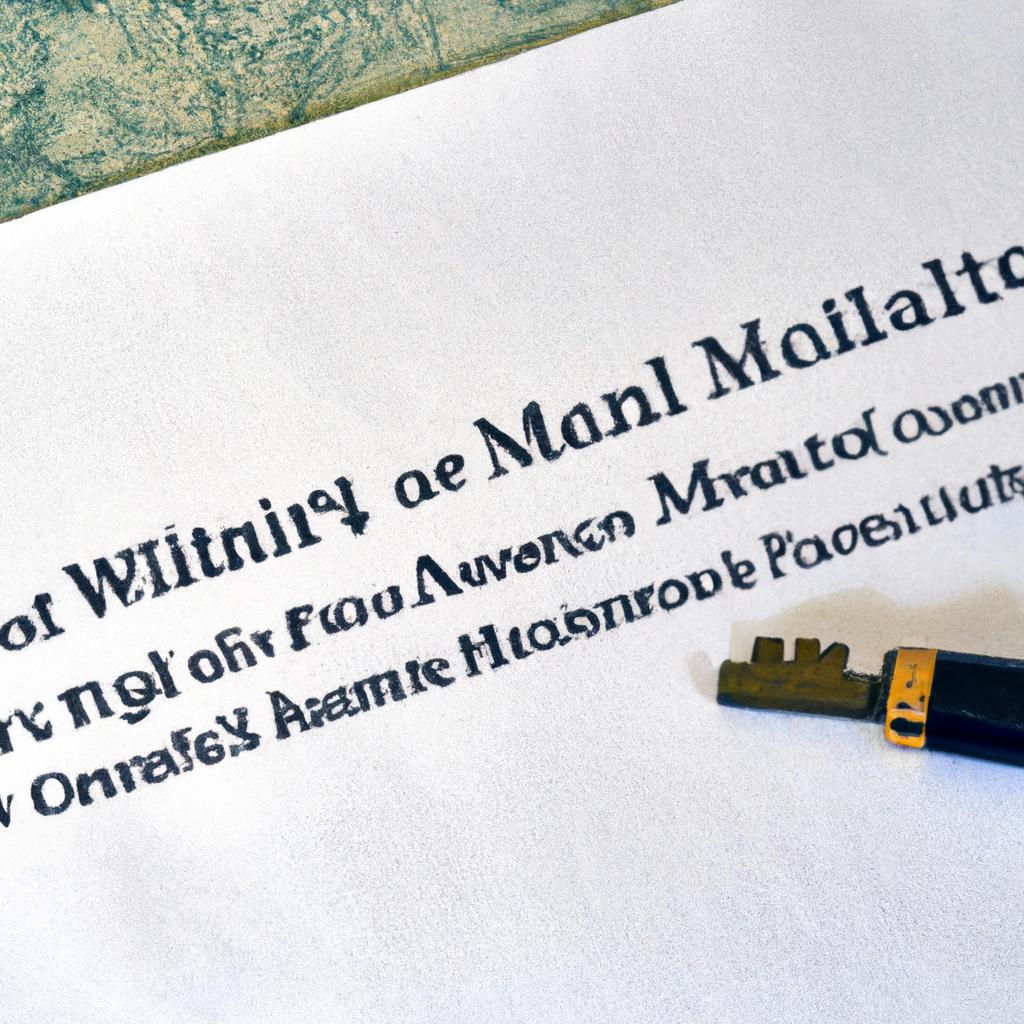In the realm of estate planning, the decision to create a joint and mutual will holds a unique significance. As experienced practitioners in the field of law, we at Morgan Legal Group recognize the complexities involved in establishing such a document. Based in the bustling metropolis of New York City, our firm specializes in assisting clients with a wide range of legal matters, including the intricacies of joint and mutual wills. Join us as we explore the nuances of this vital aspect of estate planning and delve into the implications it holds for you and your loved ones.
Understanding the Concept of Joint and Mutual Wills
Joint and mutual wills are legal documents that are often used by married couples to dictate how their assets will be distributed upon their passing. These types of wills are created together by both spouses and typically outline how their assets will be divided among their beneficiaries. The main difference between joint and mutual wills is that joint wills are typically signed by both parties, while mutual wills are separate documents that mirror each other in terms of the distribution of assets.
It is important to understand the concept of joint and mutual wills before incorporating them into your estate planning strategy. By creating a joint or mutual will, you and your spouse can ensure that your assets are distributed according to your wishes and that your loved ones are taken care of after you are gone. Consulting with an experienced estate planning attorney, such as the professionals at Morgan Legal Group, can help you navigate the complexities of joint and mutual wills and ensure that your wishes are properly documented and legally binding.

Benefits and Drawbacks of Creating Joint and Mutual Wills
Joint and mutual wills can be a beneficial estate planning tool for couples who want to ensure their assets are distributed according to their wishes. One of the main benefits of creating a joint will is that it allows both spouses to outline their wishes together, preventing any potential conflicts or disagreements after one spouse passes away. By creating a joint will, couples can also streamline the estate administration process and save time and money on legal fees.
However, there are drawbacks to creating joint and mutual wills that couples should consider. One drawback is that joint wills are typically irrevocable, meaning that once one spouse passes away, the surviving spouse cannot change the terms of the will. This lack of flexibility can be problematic if circumstances change or if the surviving spouse wants to make adjustments to the will. Additionally, joint wills may not be suitable for couples with complex financial situations or blended families, as they may not adequately address the needs of all beneficiaries.

Key Considerations for Establishing Joint and Mutual Wills
When establishing joint and mutual wills, there are several key considerations to keep in mind to ensure that your wishes are clearly outlined and legally binding. First and foremost, it is essential to carefully select your co-willmaker or co-testator, as this individual will be entering into a legally binding contract with you. This person should be someone you trust implicitly and who shares your wishes for the distribution of your assets.
- Choose a trustworthy co-willmaker
- Clearly outline the division of assets
- Consider potential conflicts among beneficiaries
Additionally, it is crucial to clearly outline the division of assets in the joint and mutual will to avoid any confusion or disputes among beneficiaries. This includes specifying who will receive which assets, as well as any conditions or restrictions on their distribution. Lastly, it is important to consider any potential conflicts that may arise among beneficiaries and address them in the will to prevent future legal battles. By carefully considering these key factors, you can ensure that your joint and mutual will accurately reflects your wishes and protects your assets for future generations.

Expert Recommendations for Drafting Joint and Mutual Wills
When it comes to drafting joint and mutual wills, it is essential to seek expert recommendations to ensure that your wishes are clearly outlined and legally binding. Joint wills are typically created by spouses or partners who wish to leave their assets to each other, while mutual wills involve two individuals leaving their assets to each other with a similar distribution plan for their heirs.
Our experienced attorneys at Morgan Legal Group recommend the following tips for drafting joint and mutual wills:
- Clearly Define Your Wishes: Be specific about how you want your assets to be distributed and consider different scenarios that may arise.
- Consult with a Legal Professional: Seeking advice from an experienced estate planning attorney can help ensure that your joint or mutual will is legally sound and reflects your intentions accurately.
- Update Your Will Regularly: Life circumstances may change, so it is important to review and update your will periodically to reflect any new assets, beneficiaries, or wishes.
Q&A
Q: What is a joint and mutual will?
A: A joint and mutual will is a legal document created by two individuals, usually a married couple, that outlines their wishes for the distribution of their assets and possessions after both of their deaths.
Q: How does a joint and mutual will differ from individual wills?
A: Unlike individual wills, a joint and mutual will is created by two people together and cannot be changed or revoked by one party after the other has passed away. This means that both individuals must agree on all aspects of the will before it is finalized.
Q: What are the benefits of a joint and mutual will?
A: One of the main benefits of a joint and mutual will is that it can help to avoid disputes between family members after both individuals have passed away. It also ensures that both parties’ wishes are respected and that their assets are distributed according to their agreed-upon plan.
Q: Are there any drawbacks to creating a joint and mutual will?
A: One potential drawback of a joint and mutual will is that it restricts the flexibility of each individual to change their estate plan in the event of changed circumstances or new developments. Additionally, if one party were to pass away before the other, the surviving individual may not be able to make changes to the will.
Q: How should individuals go about creating a joint and mutual will?
A: It is advisable for individuals considering a joint and mutual will to seek the advice of a legal professional, such as an estate planning attorney. This will ensure that the document is properly drafted and executed according to the laws of the jurisdiction in which they reside.
In Summary
In conclusion, joint and mutual wills can be powerful tools for couples looking to ensure their final wishes are carried out together. By setting out clear instructions for how their assets should be distributed after both parties have passed away, they can provide peace of mind and security for their loved ones. While it is important to seek legal advice when creating a joint and mutual will, the benefits can be well worth the effort. Consider discussing this option with your partner to determine if it is the right choice for your estate planning needs. It’s never too early to start thinking about the future, and a joint and mutual will can help you and your partner feel confident that your wishes will be respected.


